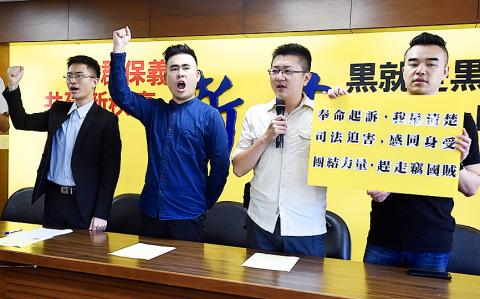The New Party yesterday expressed support for former president Ma Ying-jeou (馬英九), accusing the Chinese Nationalist Party (KMT) of distancing itself from the former KMT chairman after his most recent indictment.
The New Party is a KMT spin-off established in 1993 that advocates unification with China. It does not hold any legislative seats.
New Party spokesman Wang Ping-chung (王炳忠) said that at a time when the Democratic Progressive Party administration is using the judiciary to oppress Ma, scarcely anyone from the KMT has spoken out against political persecution.

Photo: Chien Jung-fong, Taipei Times
“You [KMT members] enjoyed the largest share of the KMT’s resources in the past, but now you are hiding to avoid taking responsibility,” Wang told a news conference yesterday, adding that the KMT has apparently degenerated into the “Taiwanese Nationalist Party.”
Wang was referring to remarks by KMT Chairman Wu Den-yih (吳敦義) at a meeting of the KMT’s Central Standing Committee on Wednesday, at which Ma was invited to explain the sale of Central Motion Picture Corp, Broadcasting Corp of China and China Television Co while he was KMT chairman in 2005 and 2006.
“We are not trying to fight a government agency, nor endorsing a specific individual,” Wu said at the time. “We are simply hoping to examine the appropriateness of Ma’s handling of the sales through a fair and objective lens.”
Wu’s statement was perceived as a departure from the KMT’s initial reaction to Ma’s indictment, when it expressed its confidence in Ma’s integrity.
Ma on Tuesday last week was charged with breach of trust and contravening the Securities and Exchange Act (證券交易法) for his alleged role in the KMT’s sale of assets in 2005 and 2006, including the three companies.
The two people who managed the KMT’s finances used an elaborate financial scheme, which Ma approved, that enabled the party to sell the media companies and other assets at below market prices, which caused the KMT to lose NT$7.29 billion (US$237.34 million at the current exchange rate), the indictment said.
New Party youth wing executive Hou Han-ting (侯漢廷) said that the indictment was riddled with problems and based on trumped-up charges, including allegations that Ma sold the companies to avoid them being returned to the government.
“How could Ma have predicted the establishment of the Ill-gotten Party Assets Settlement Committee?” Hou asked.

‘DENIAL DEFENSE’: The US would increase its military presence with uncrewed ships, and submarines, while boosting defense in the Indo-Pacific, a Pete Hegseth memo said The US is reorienting its military strategy to focus primarily on deterring a potential Chinese invasion of Taiwan, a memo signed by US Secretary of Defense Pete Hegseth showed. The memo also called on Taiwan to increase its defense spending. The document, known as the “Interim National Defense Strategic Guidance,” was distributed this month and detailed the national defense plans of US President Donald Trump’s administration, an article in the Washington Post said on Saturday. It outlines how the US can prepare for a potential war with China and defend itself from threats in the “near abroad,” including Greenland and the Panama

A wild live dugong was found in Taiwan for the first time in 88 years, after it was accidentally caught by a fisher’s net on Tuesday in Yilan County’s Fenniaolin (粉鳥林). This is the first sighting of the species in Taiwan since 1937, having already been considered “extinct” in the country and considered as “vulnerable” by the International Union for Conservation of Nature. A fisher surnamed Chen (陳) went to Fenniaolin to collect the fish in his netting, but instead caught a 3m long, 500kg dugong. The fisher released the animal back into the wild, not realizing it was an endangered species at

The Chinese Nationalist Party (KMT) is maintaining close ties with Beijing, the Democratic Progressive Party (DPP) said yesterday, hours after a new round of Chinese military drills in the Taiwan Strait began. Political parties in a democracy have a responsibility to be loyal to the nation and defend its sovereignty, DPP spokesman Justin Wu (吳崢) told a news conference in Taipei. His comments came hours after Beijing announced via Chinese state media that the Chinese People’s Liberation Army’s Eastern Theater Command was holding large-scale drills simulating a multi-pronged attack on Taiwan. Contrary to the KMT’s claims that it is staunchly anti-communist, KMT Deputy

The High Prosecutors’ Office yesterday withdrew an appeal against the acquittal of a former bank manager 22 years after his death, marking Taiwan’s first instance of prosecutors rendering posthumous justice to a wrongfully convicted defendant. Chu Ching-en (諸慶恩) — formerly a manager at the Taipei branch of BNP Paribas — was in 1999 accused by Weng Mao-chung (翁茂鍾), then-president of Chia Her Industrial Co, of forging a request for a fixed deposit of US$10 million by I-Hwa Industrial Co, a subsidiary of Chia Her, which was used as collateral. Chu was ruled not guilty in the first trial, but was found guilty